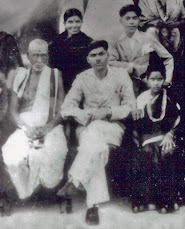Surya's views on the Ego Structure in Hindu family
In this related paper, Dr. Surya begins by arguing that a psychological concept originated in one culture cannot be just transposed to another culture without being distorted. It is often the beginning of subsequent difficulties. He writes:
One of the cornerstones of psychoanalytical theory is that early childhood influences greatly shape the development of the adult personality. In the transcultural field this has resulted into many studies on childhood rearing practices in different cultures with a view to understand how different family influences in different cultures shape different cultural personalities. Many Indian psychiatrists and psychologists over the years have written on this subject (See Varma 1992). Again we find that few have equaled the clarity and originality of Dr. Surya's writings in his paper in 1966 (Neki 1976). Since his formulation on the subject is important, I quote him at length:
"The important items of background in which an individual develops in the Hindu joint family, are:-
i)Exposure to social relationships is spread over a number of persons- grand parents, uncles, aunts, parents, sibs, etc. The parents do not have the explicit or implicit privilege of being the sole agents for structuring social relationships and regulations for the child.
ii)As the individual grows up he or she progresses through an unending series of dependency relationships through a large kinship circle although with varying degrees of intensity and duration. There is no point of time as at which one can look forward to a relatively free and full independent individual responsibility.
iii)Marriage does not connote a landmark to the development of a fully independent unit. It marks the beginning of a new set of relationships-the recurring decimal of dependency relationships.
iv)The ever-lasting and ever-recurring dependency relationships are governed by concepts of inbred status. A relatively rigid status concept is divorced from the concept of role.
v)The concept of 'mine', 'not mine' is never clearly demarcated."











